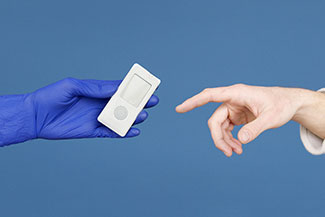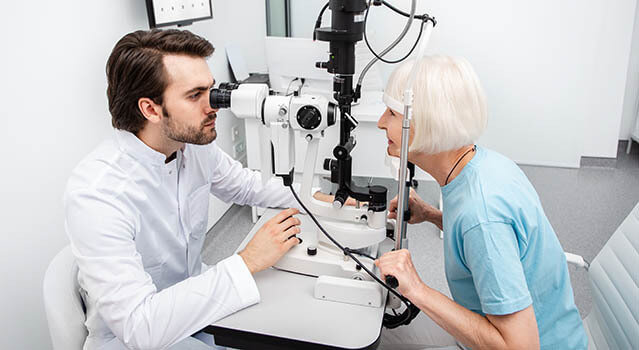Eye Disease Management
Is your vision blurred or cloudy? Seeing dark spaces in the center of your vision? You might have an eye disease. Contact us for effective treatment and experience a heightened quality of life.
Eye Disease Diagnosis and Treatment

Your eyes keep changing with every year that goes by, and this affects vision. At Lasik & Cataract Surgery Center At Family Eyecare Center of Optometry, we can detect these changes and identify eye conditions or diseases early enough to treat and prevent vision loss. Whether you have diabetic retinopathy, glaucoma, cataracts, or macular degeneration, we’re here to help you maintain the best vision and eye health possible.
Eye Disease Treatments
We diagnose, manage and treat diseases like diabetic retinopathy, cataracts, glaucoma and macular degeneration. The earlier the diagnosis, the better your chances for successful treatment.
What is Diabetic Retinopathy and How Can It Be Treated?
Diabetic retinopathy occurs when the retina's tiny blood vessels weaken and inflate as a result of high blood sugar levels. As the blood vessels grow, they bleed—causing severe vision loss, and in extreme cases even blindness.
The early and intermediate phases of this disease typically show no symptoms or warning signs. However, as the macula (central part of the retina) becomes inflamed and the disease progresses, discomfort or blurred vision may develop.
Note that diabetic retinopathy can be treated before any vision loss occurs. Treatment and management options include:
- Medication
- Anti-VEGF or steroid injections
- Laser surgery
- Vitrectomy
I wish we could give 10 stars. Dr. Ashcraft and Stacey are amazing at what they do. My father has low vision issues and from the minute we contacted Family Eyecare Center I knew we had the right place and would be in good hands. We talked with Stacey many times and Dr. Ashcraft twice for close to 30 minutes each time before even coming in. The amount of attention they give to each patient is phenomenal. They were kind, caring, reassuring, and extremely skilled at what they do.
Dr. Ashcraft identified what was wrong with my father’s previous prescription glasses and assisted my dad with vision concerns around obtaining a driver’s license. He shared so much knowledge with us and it felt so good to be with a doctor that understood what my dad was experiencing. My dad felt so relieved and said that Dr. Ashcraft is the best optometrist he has ever been to. He even let me look through the bioptic telescope glasses that he had my father try on so that I could see what a difference it would make for my father. Really grateful for what they did for my father and all the good they do for so many patients, particularly those with low vision issues.
Thanks, Dr. Ashcraft, Stacey and the team!
What Is Glaucoma and How Can It Be Treated?
Glaucoma is a group of eye diseases caused by a buildup of pressure within the eye. The longer the pressure builds, the more damage it causes, especially to the optic nerve.
In the absence of medical intervention, the nerve will continually deteriorate, resulting in permanent vision loss or blindness.
While glaucoma cannot be cured, there are several treatments that can help slow down the progression of this disease. These treatments include:
- Eye drops
- Oral medications
- Filtration surgery
- Laser therapy
- Drainage tubes
- Minimally invasive glaucoma surgery (MIGS)


What Are Cataracts and How Can The Disease Be Treated?
A cataract occurs when the clear lens inside our eye becomes cloudy. Cataracts develop slowly and reduce the amount of light that can get through the lens, rendering it difficult to see. Those with cataracts feel as if they’re perpetually looking through a dirty window that cannot be cleaned.
If the cataract is at an advanced stage, your eye doctor will likely recommend cataract surgery, a safe procedure where the cloudy lens is replaced with a new intraocular lens (IOL).
What is Macular Degeneration and
How Can It Be Treated?
Macular degeneration is the deterioration of the central part of the retina, the part of the eye that records the images we see and sends them back to the brain. As the macula deteriorates, the brain receives blurred or distorted images instead of clear and bright images.
There are two types of macular degeneration: dry AMD and wet AMD.
While there is currently no treatment for dry AMD, those with significant vision loss might benefit from taking certain nutritional supplements.
For wet AMD, treatment options include:
- Anti-VEGF Injections
- Photodynamic Therapy (PDT)
- Laser Photocoagulation

Eye Disease Management | FAQ
We believe that a person’s quality of life is profoundly associated with the quality of their vision. Vision problems, whether due to glaucoma, cataracts, macular degeneration or diabetic retinopathy, affect all aspects of one’s life. We at Lasik & Cataract Surgery Center At Family Eyecare Center of Optometry can help prevent further vision deterioration and manage your current symptoms.
Schedule a consultation with our optometric team and we’ll help you find the best solution for your condition and lifestyle.









